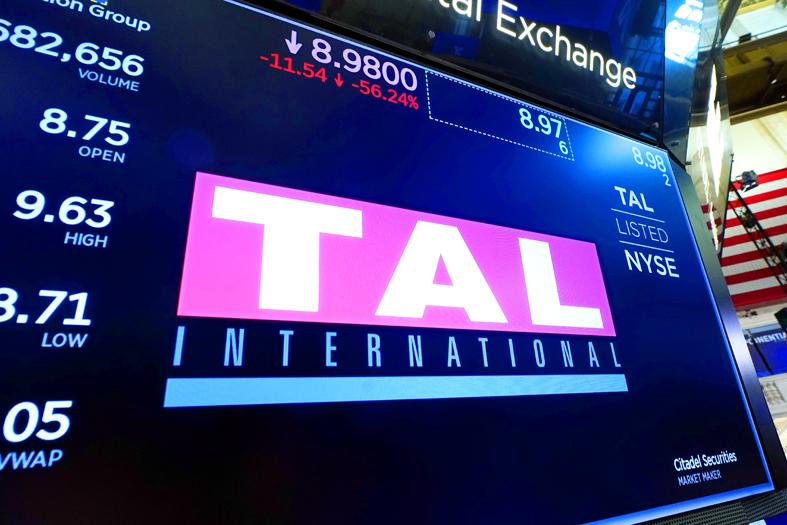A selloff in Chinese private education companies yesterday sent shockwaves through the nation’s equity market, as investors scrambled to price in the growing risks from an intensifying crackdown by Beijing on its industries.
Stocks slumped on the mainland and in Hong Kong, with the benchmark CSI 300 Index and the Hang Seng Index tumbling more than 3 percent. Education stocks plunged in the wake of a sweeping overhaul that threatens to upend the US$100 billion sector and jeopardize billions of dollars in foreign investment.
“I see panic-selling in the market now as investors are pricing in a possibility that Beijing will tighten regulation on all sectors that have seen robust growth in recent years,” Core Pacific Yamaichi research head Castor Pang (彭偉新) said.

Photo: AP
“I don’t think investors can do any bottom fishing at this point. We don’t know where the bottom is,” Pang added.
New Oriental Education & Technology Group Inc (新東方教育科技集團) plunged as much as 40 percent in Hong Kong, extending Friday’s record 41 percent fall.
It warned in a filing that the regulations would have an adverse material impact on the company.
Koolearn Technology Holding Ltd (新東方在線科技控股) tumbled as much as 35 percent, the biggest decliner on the Hang Seng Tech Index, which fell as much as 7.1 percent, its biggest fall ever.
China Maple Leaf Educational Systems Ltd (中國楓葉教育集團) dropped 16 percent.
Chinese regulators on Saturday published reforms that would fundamentally alter the business model of private firms teaching the school curriculum, as Beijing aims to overhaul a sector that it says has been “hijacked by capital.”
The new regulations ban firms that teach school curriculums from making a profit, raising capital or going public.
Friday was a bloodbath for the sector in Hong Kong and the US, after a leaked document circulated on social media.
The “worst-case became a reality,” JPMorgan Chase & Co analysts, including DS Kim, wrote in a note, saying that it was uncertain whether the companies could remain listed.
“It’s unclear what level of restructuring the companies should undergo with a new regime and, in our view, this makes these stocks virtually uninvestable,” they said.
Chinese education stocks have seen their market value fall more than US$100 billion since the beginning of this year, with TAL Education Group (好未來教育集團) and New Oriental losing a combined US$65 billion, Bloomberg data showed.
“Overall sentiment is really bad now,” Amber Hill Capital Ltd (安山資本) asset management director Jackson Wong (黃志陽) said. “Regulations on the education sector were unexpected and are really negative for the general market.”
Mainland investors have been net selling Hong Kong shares via exchange links in the territory for a sixth straight day, on track for the longest streak since May 2019, Bloomberg data showed.

Intel Corp chief executive officer Lip-Bu Tan (陳立武) is expected to meet with Taiwanese suppliers next month in conjunction with the opening of the Computex Taipei trade show, supply chain sources said on Monday. The visit, the first for Tan to Taiwan since assuming his new post last month, would be aimed at enhancing Intel’s ties with suppliers in Taiwan as he attempts to help turn around the struggling US chipmaker, the sources said. Tan is to hold a banquet to celebrate Intel’s 40-year presence in Taiwan before Computex opens on May 20 and invite dozens of Taiwanese suppliers to exchange views

Application-specific integrated circuit designer Faraday Technology Corp (智原) yesterday said that although revenue this quarter would decline 30 percent from last quarter, it retained its full-year forecast of revenue growth of 100 percent. The company attributed the quarterly drop to a slowdown in customers’ production of chips using Faraday’s advanced packaging technology. The company is still confident about its revenue growth this year, given its strong “design-win” — or the projects it won to help customers design their chips, Faraday president Steve Wang (王國雍) told an online earnings conference. “The design-win this year is better than we expected. We believe we will win

Quanta Computer Inc (廣達) chairman Barry Lam (林百里) is expected to share his views about the artificial intelligence (AI) industry’s prospects during his speech at the company’s 37th anniversary ceremony, as AI servers have become a new growth engine for the equipment manufacturing service provider. Lam’s speech is much anticipated, as Quanta has risen as one of the world’s major AI server suppliers. The company reported a 30 percent year-on-year growth in consolidated revenue to NT$1.41 trillion (US$43.35 billion) last year, thanks to fast-growing demand for servers, especially those with AI capabilities. The company told investors in November last year that

Power supply and electronic components maker Delta Electronics Inc (台達電) yesterday said it plans to ship its new 1 megawatt charging systems for electric trucks and buses in the first half of next year at the earliest. The new charging piles, which deliver up to 1 megawatt of charging power, are designed for heavy-duty electric vehicles, and support a maximum current of 1,500 amperes and output of 1,250 volts, Delta said in a news release. “If everything goes smoothly, we could begin shipping those new charging systems as early as in the first half of next year,” a company official said. The new